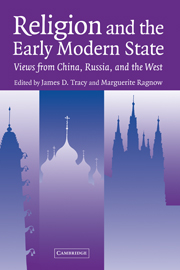Book contents
- Frontmatter
- Contents
- Contributors
- Acknowledgments
- Preface
- Religion and the Early Modern State
- Introduction
- PART I LIVED RELIGION AND OFFICIAL RELIGION
- PART II FORMS OF RELIGIOUS IDENTITY
- 5 Spirits of the Penumbra: Dieties Worshiped in More Than One Chinese Pantheon
- 6 Orthodoxy and Revolt: The Role of Religion in the Seventeenth-Century Ukrainian Uprising against the Polish-Lithuanian Commonwealth
- 7 The Huguenot Minority in Early Modern France
- 8 State Religion and Puritan Resistance in Early Seventeenth-Century England
- PART III THE SOCIAL ARTICULATION OF BELIEF
- AN EPILOGUE AT THE PARISH LEVEL
- Selected Annotated Bibliography of Secondary Works
- Index
7 - The Huguenot Minority in Early Modern France
Published online by Cambridge University Press: 23 May 2010
- Frontmatter
- Contents
- Contributors
- Acknowledgments
- Preface
- Religion and the Early Modern State
- Introduction
- PART I LIVED RELIGION AND OFFICIAL RELIGION
- PART II FORMS OF RELIGIOUS IDENTITY
- 5 Spirits of the Penumbra: Dieties Worshiped in More Than One Chinese Pantheon
- 6 Orthodoxy and Revolt: The Role of Religion in the Seventeenth-Century Ukrainian Uprising against the Polish-Lithuanian Commonwealth
- 7 The Huguenot Minority in Early Modern France
- 8 State Religion and Puritan Resistance in Early Seventeenth-Century England
- PART III THE SOCIAL ARTICULATION OF BELIEF
- AN EPILOGUE AT THE PARISH LEVEL
- Selected Annotated Bibliography of Secondary Works
- Index
Summary
Despite substantial, sustained effort and encouraging initial success, the Protestant movement in France never advanced beyond the status of a permanent if vigorous religious and political minority. The Reformation clearly attracted a sizable following among the elite, drawing in particular from the nobility and urban bourgeoisie. Protestantism also appealed to many artisans and even persons from the rural agricultural world. Yet the protracted strife over the second half of the sixteenth century took its toll. Overall numerical strength among the Huguenots probably peaked in 1572 on the eve of the St. Bartholomew's Day massacre, or perhaps already a decade earlier at the beginning of the Wars of Religion. Scholars have suggested a total of some two million Protestants in 1560, roughly ten percent of the French population. More importantly, among the politically influential nobles, Huguenot strength may have been close to fifty percent. Fortunes declined steadily thereafter, and by the end of the sixteenth century, Protestants were no more than six to seven percent of the French population. The best estimates appear to be in the range of 1.2 million persons, perhaps slightly more.
At the same time, the Huguenots were heavily concentrated in the western and southern portions of the kingdom. They lived on the Atlantic coast at La Rochelle and were spread across the provinces of Normandy and Poitou. To the south, Reformed communities at towns such as Castres and Montauban, Montpellier, and Nîmes have become legendary in the history of French Protestantism.
- Type
- Chapter
- Information
- Religion and the Early Modern StateViews from China, Russia, and the West, pp. 185 - 206Publisher: Cambridge University PressPrint publication year: 2004

